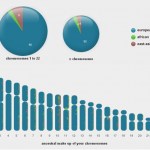
The main theme of this year's Advances in Genome Biology and Technology meeting should come as no surprise to regular readers: sequencing. Generating as many bases of DNA sequence as quickly, cheaply and accurately as possible is the goal of the moment, and the number of companies jostling to achieve that goal is growing rapidly.
The meeting saw impressive performances from established players in the field, especially Illumina: their new HiSeq 2000 instrument seems to have dug in as the platform of choice for generating vast amounts of high-quality short-read data. Life Technologies…
Stephen Turner from Pacific Biosciences gave a dramatic presentation this afternoon launching PacBio's new third-generation sequencing instrument. The room was packed for the seminar, with a palpable buzz, and Turner's presentation was preceded by a theatrical introduction from PacBio CEO Hugh Martin.
The crescendo of Turner's presentation was the unveiling of a video showing the new (and enormous) PacBio instrument, which has been tucked away in a room here at AGBT and revealed to a trickle of VIPs (including Bio-IT World's Kevin Davies) - if that's the kind of thing you're into,…
I've been remiss in blogging from the Advances in Genome Biology and Technology meeting here in Marco Island, Florida, primarily due to some panic-stricken last-minute changes to the slides for my own presentation last night.
Fortunately the conference has been extremely well-covered by others: Sanger colleague Luke Jostins has blog posts up summarising day 1 and day 2 of the meeting; Dan Koboldt from MassGenomics has his first impressions and a review of the cancer genomics session; and Anthony Fejes is continuing the tradition of publishing extensive notes on every talk he attends. …
I'll be at the Advances in Genome Biology and Technology meeting in Marco Island, Florida for the next week, soaking up sun and genomics, keeping my eye out for the anticipated major announcements from sequencing companies and researchers, and quietly panicking about my presentation on Thursday. You'll hear more about the meeting from me and the other bloggers there - Luke Jostins, David Dooling, Dan Koboldt and Anthony Fejes - over the next week.
It's amazing to think that it was at the same meeting in 2009 - just one year ago - that Complete Genomics emerged dramatically from stealth mode…
The Genomes Environments Traits conference in Boston is without a doubt the place to be on April 27th for anyone interested in personal genomics: the conference has managed to attract nearly every human being in the world who has had their complete genome sequenced (excluding, of course, anonymous participants in the 1000 Genomes Project and various cancer studies), as well as an impressive list of luminaries from the field.
Wired describes the meeting as "The First and Last Meeting of Everyone with a Fully Sequenced Genome", and while that's a little hyperbolic (the…
My wife and I have embarked on our first collaborative genetic experiment:
Subscribe to Genetic Future.
Follow Daniel on Twitter
A reader pointed me to this article in the Australian news: it appears that a major Australian insurance company, NIB, is planning to offer half-price genome scans from personal genomics company Navigenics to 5,000 of its customers.
The catch is in the fine print: those who take up the offer "may have to give the information to life insurance or superannuation providers", according to the article. In a letter to customers, the chief executive of the company explicitly says that this information could be used to alter the premiums people pay for their life insurance:
The chief…
This piece in Newsweek is a neat summary of the rise and fall of Icelandic genomics giant deCODE Genetics. Regular readers of Genetic Future will be aware that the company has been steadily bleeding capital ever since its launch over a decade ago, and recently declared formal bankruptcy. Since then the company has been bought up by US-based company Saga Investments. (For an excellent analysis of the implications of this sale, see Dan Vorhaus' post on Genomics Law Report.)
A reader emailed me to point out that buried towards the end of the Newsweek article is an ominous paragraph for…
Blogging on Genetic Future will be pretty much non-existent for the next three weeks.
Disclaimer: my wife and I have both received and used free testing kits from Counsyl.
Counsyl is a rather enigmatic player in the personal genomics field: apart from a brief mention in Steven Pinker's excellent NY Times piece over a year ago and an even briefer post on a Newsweek blog late last year, the company has been in determined stealth mode for much of the last two years.
All that was publicly known about the company when I wrote about them last year was that they will be offering a large-scale carrier screening test: basically, allowing couples who are considering having a baby to…
Continuing my new tradition, here are some of the genomics-related links and information I posted on Twitter this week:
RT @decodegenetics: The opportunity to migrate to deCODEme ends on February 1st 2010. http://bit.ly/86Xtsh
Gah, it burns! RT @jcbarret: Science publishes behavioral genetic association, N=72 humans and 68 mice http://bit.ly/68rC7E
The Motley Fool discusses flow-on benefits to personal genomics companies as sequencing costs drop: http://bit.ly/5BtgjR
RT @Duncande: Complete Genomics announced 1 hour ago the $1500 genome, 1 day after Illumina announced $10,000 genome, at the…
Keith Robison has a perceptive piece riffing off the recent Illumina instrument launch, and ponders whether 2010 will be the year that array-based genomic technologies finally start to die off with the rise of sequencing.
The market certainly seems to think so. Check out the immediate effect on stock prices for Illumina (ILMN) and array manufacturer Affymetrix (AFFX) following the Illumina announcement (both normalised to 0 at the start of the graph):
This comes in the context of long-term stagnation of AFFX stock, while Illumina has exploded over the last five years. Illumina made plenty…
The big news from the JP Morgan investment conference today is the announcement of a brand new shiny sequencing machine from Illumina, the HiSeq 2000. The new machine boasts an impressive set of statistics, and looks likely to gradually replace Illumina's GAIIx as the workhorse of most modern sequencing facilities.
So, how excited should we be?
Let's be clear about this up front: this new machine, while impressive, represents an incremental advance rather than a dramatic technological leap forward. This is still second-generation sequencing, generating relatively small snippets of DNA…
Some of you may know that I post many links of interest that don't make it into a full blog post via Twitter. Since I know there are a number of blog readers who haven't yet made the move to Twitter, I'm going to follow in Dan Vorhaus' footsteps by posting a weekly roundup of useful links here on Genetic Future.
Here's episode 1, encompassing the first week of 2010:
RT @eurogene Don't worry, personal genomics is not dying (despite Peter Aldhous), it's growing, just shedding skin
Pardis Sabeti's beautiful work on refining signals of selection in the human genome is out in Science: http://…
Several articles with a personal genomics theme popped up today.
Most importantly, this piece in the Times by Mark Henderson is a superb analysis of the current state and likely future of the personal genomics industry, and a must-read for anyone interested in the field.
Henderson notes that despite the turmoil in the industry in 2009, it's still unclear which of the disparate models adopted by competitors in the industry (e.g. 23andMe's curiosity-driven "genomics is fun" approach, or Navigenics' sombre, paternalistic, health-focused image) will prove the most successful in the long run:…
Genetic genealogist Blaine Bettinger has a fantastic post dissecting and contextualising a rather worrying result from his personal genomic analysis: a 50-60% increased lifetime risk of type 2 diabetes.
Blaine is unfortunate enough to be among the 1-2% of individuals who carry two risky versions at each of three major risk variants for the disease. (It's worth noting that type 2 diabetes risk is determined by many different genetic variants, most of which remain unknown, as well as environmental factors - so Blaine's discovery is very far from a certain diagnosis of the disease.)
Blaine's…
The Gene Sherpa predicts that Complete Genomics will win the Archon X Prize in Genomics in 2010. In the comments, Keith Robison is wisely skeptical. I agree with Keith - it's unlikely that the X Prize will be won this year, and if it is the winner is unlikely to be Complete Genomics.
For those who don't know the prize, here's the brief summary: the X Prize Foundation will give US$10 million to the first team to satisfy the following conditions:
sequence 100 human genomes within 10 days or less, with
an accuracy of no more than one error in every 100,000 bases sequenced [note that the…
I'm currently playing around with my 23andMe data in the deCODEme browser.
deCODEme's (apparently new?) Relationship Check feature, which appears to be a targeted version of 23andMe's Relative Finder algorithm, allows users to compare their genetic data to other profiles in the database and calculate the probability of a familial relationship.
My comparison with notoriously cranky deCODE CEO Kari Stefansson (pictured, left) gave me this reassuring result:
Phew!
On Twitter, genetic genealogist extraordinaire Blaine Bettinger noted that deCODEme appears to have also…
Late last week I noted an intriguing offer by personal genomics company deCODEme: customers of rival genome scan provider 23andMe can now upload and analyse their 23andMe data through the deCODEme pipeline.
On the face of it that's a fairly surprising offer. As I noted in my previous post, interpretation is what generates the real value for personal genomics companies, so giving it away for free seems a bizarre approach to business - especially for a company living on the edge of a financial precipice. However, I also argued that the intention here is likely to be to generate an…
A curious tweet this morning from personal genomics company deCODEme, barely a few weeks after the declaration of formal bankruptcy of parent company deCODE Genetics:
@decodegenetics: Migrate to deCODE this winter! Upload your genetic data for free. http://www.decodeme.com/data-upload
Here's a description of the service from the URL in the tweet:
deCODEme wants to give even more people the chance to enjoy the best in personal genomics. Our bioinformatics team has just launched a simple system to enable existing customers of 23andMe⢠to migrate their data into deCODEme and to join our…





